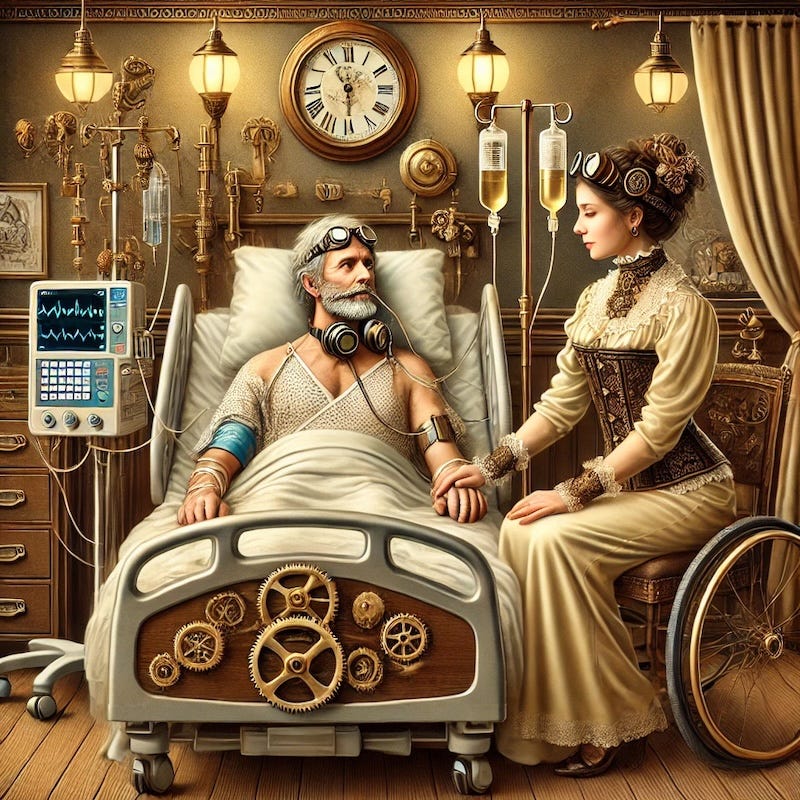A Good Death
Imagine you are in terrible pain and you are dying. How would you choose to die?
Imagine you are in terrible pain and you are dying.
At the end of your street is a facility, A Final Farewell, that offers you the option of a good death. You’ll need confirmation from your doctor that you really are dying and a second doctor will interview you to be sure you know what you are doing and no evil son-in-law is coercing you. You can change your mind at any time.
On the special day, you head down to A Final Farewell with your wife and family and they have a beautiful room prepared for you. You hang out for a while with some close friends and say goodbye. You enjoy an entrecôte steak with your family and a lovely glass of Fuller’s Vintage Ale and then it’s time.
A Final Farewell has prepared a bench for you under an old oak tree surrounded by daffodils and primroses and the sun is shining. Erik Satie’s Gymnopédie is playing softly. You have one final hug with your wife and she whispers, “I love you so much. Safe travels.”
You drink the glass of medication that has been prepared for you and your life on this earth is over.
There’s no obligation to choose the good death. Most people will still choose palliative care. Palliative care is like a miracle for many people but it doesn’t work for everyone.
Some patients will continue to bear unbearable pain. Other patients will go into a coma that lasts for weeks and months while their family cleans them and turns them to prevent bed sores.
I will choose palliative care for myself but I will be grateful for the option of a good death if palliative care is not working for me.
Palliative care is already available now, of course, but the bill to be debated in Parliament tomorrow will offer the option of a good death too.
These are not the only options available to patients who are dying. If you are in a coma, you can leave instructions for your nursing team to starve you to death. Dying of thirst is another option.
If the pain is unbearable despite palliative care, your doctor can increase your morphine until it kills you. This happens less often now since Dr Shipman got carried away and killed over a dozen people without asking them first.
Dignitas in Switzerland offers the opportunity for a good death but if your wife accompanies you she will be investigated for assisted suicide. Prosecutions are rare but your wife will be investigated by the police and probate will be held up until she is cleared. You must go to Switzerland on your own.
Suicide is another option. You can connect a pipe to the exhaust of your car. You will die alone.
There will be restrictions on who can choose a good death under the new law. It will not be available to handicapped people — unless they are already dying. Neither will it be available to people with dementia or depression or other mental illnesses.
The courts in Canada changed their Medical Assistance in Death law to widen its scope but the constitution in England and Wales does not allow this and, by contrast, the Death with Dignity law in Oregon has not changed in twenty-five years.
There will surely be problems with the new law in England and Wales. The most pressing to be solved is how to prevent vulnerable people from feeling pressured into a choice they would not otherwise choose. But the law will give dying patients an option that is long overdue.
What would you choose for yourself if you were given the choice?
Would you choose a good death?
☕️ Buy me a coffee? ☕️
It won’t make me rich but it’ll make me happy.
Credit to Nigel Warburton for the idea for this post.







Wow what can I say this is one of the most emotional posts I’ve read here.
My mother suffered a long and hard death, she had a rare form of dementia so rare doctors could never get to the bottom of it.
20 years earlier my father committed suicide in a car in on a country road.
He had the better death and there is something so wrong with that.
I live in Maine, one of the 10 U.S. states that have legalized Death With Dignity. My mother belonged to the Hemlock Society and although she died 8 years before the law was passed, I'm convinced she "offed" herself with the comfort kit that a nurse surreptitiously put within her reach. We also have very specific Living Wills/Medical Directives and DNRs (Do Not Resuscitate orders). My family appreciates being able to make informed end-of-life decisions. It helps us face the reality of our mortality. We even dig our own gravesites in the family plot (with a permit) and hold family picnics in the cemetary. If we learned anything from Covid, it's that unless dying alone is a choice, it's utterly barbaric and inhumane to be forced to die alone. I love your writings and illustrations, Ragged Clown!